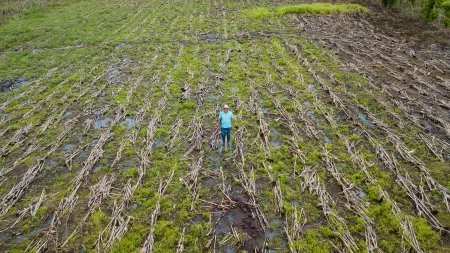
Landmark agreements but COP28 deal weak on adaptation finance
Despite the historical decisions on the fossil fuel transitions and the Loss and Damage Fund, the Conference failed to secure robust financial support to low-income countries.

As the climate emergency grows, it is estimated an additional 132 million people will be pushed into poverty by 2030 as a result of climate change.
For CARE International, climate justice is about realizing a future in which the poorest and most marginalized people have significantly improved their wellbeing and can enjoy their human rights through greater resilience to the climate emergency, increased equality and a global temperature rise that is limited to 1.5°C.
Our goal is that by 2030, 25 million poor and marginalized people, particularly women and girls, have strengthened their resilience and adaptive capacities to the effects of the climate emergency.
Though the climate emergency affects all of us, it exacerbates existing inequalities, such as those caused by wealth, age, race, and gender.
People who rely on biodiversity for survival are no longer able to produce food; people who can only afford basic shelter have their homes destroyed through repeated cyclones; people who don't have any insurance or savings must rebuild their lives from nothing after disasters.
Reversals in global carbon emissions have not been reached and global temperatures keep rising. The impact of this climate emergency increases the gaps between rich and poor and has a disproportionate impact on women and girls.
For example, as resources diminish, women and girls often take on more domestic and care work. In the event of a disaster, women can face increased threats of violence, sexual, or economic abuse and younger girls can be sent into early or forced marriage as their families face extreme economic hardship. Women have slower economic recovery compared to men and generally experience poorer reproductive and maternal health outcomes due to food insecurity, exhaustion, heat, and waterborne diseases.
The greatest responsibility for causing the climate emergency lies with the rich polluting class, and primarily in countries in the Global North. The poorest 50% of the world are responsible for less than 10% of the global CO2 emissions. The global top 1% income earners, mostly men, are responsible for more than twice as much pollution as the bottom 50% income earners.
We can counteract some of this damage through robust policies, that put equality and inclusions at the heart. These must be supported by actions that help all people to increase their ability to withstand climate related shocks and stresses, and that limit global temperature rise to 1.5°C.

We believe that everyone has the right to live on a healthy planet. CARE International aims to strengthen the resilience of the poorest and most marginalized people on the frontlines of the climate emergency, particularly women and girls.
CARE International and our partners are well-positioned to work on these changes, due to our long-standing experience in addressing climate justice through:
Globally, our work on climate change is to help ensure that the rights of the poorest and most vulnerable people are heard at international climate emergency negotiations and when planning and delivering projects that help people adapt and become more resilient to climate shocks. This includes helping people learn new farming techniques that help them withstand the impacts of recurring disasters. It also means securing people’s rights and access to valuable natural resources. With the right knowledge and sufficient means, people can take the necessary steps to safeguard their own lives, incomes and futures. And by strengthening women’s voices, we ensure they have a stronger say in decisions that affect their lives.
Read our Vision 2030 Impact Area Strategy for Climate Justice here and visit the CARE Climate Justice Center for more information.

Despite the historical decisions on the fossil fuel transitions and the Loss and Damage Fund, the Conference failed to secure robust financial support to low-income countries.

As the first week of negotiations at COP28 draws to a close, progress on some of the most important issues has stalled.

The unprecedented presence of fossil fuel lobbyists can halt urgent negotiations to limit global warming, says CARE's Climate Justice Global Policy Lead.

Join us in supporting a whole generation of women and girls who are on the frontline of the impacts AND solutions to the climate emergency.
From Ecuador to Kenya and Bangladesh, women and girls are leading solutions to adapt to the climate crisis.

Globally, only 0.01% of climate change funding supports projects that address both climate change and women’s rights. In organizations like CARE and our partners, we help find the spaces where gender justice and climate justice intersect. 56% of CARE’s climate projects address gender-based violence, and 49% are at least gender responsive on our scale for gender in programming.

93% of the climate finance reported by wealthy countries between 2011 and 2020 was taken directly from development aid, new research from CARE has found, potentially threatening the progress of the Sustainable Development Goals.
CARE recognises that to achieve our global vision we must prevent, reduce, and mitigate our own impact on climate change and environmental crises.

Developing countries and those that are particularly vulnerable to adverse impacts of climate change will not obtain the support to which they are entitled unless the wealthy, CARE's new report asserts.
In FY2023, CARE worked around the world, contributing to saving lives, fighting poverty, and increasing social justice.